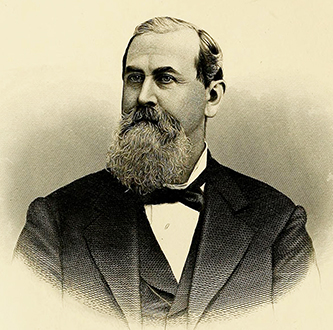Tucker, Rufus Sylvester
5 Apr. 1829–4 Aug. 1894
 Rufus Sylvester Tucker, merchant and planter, was born in Raleigh, the third son of three children of Ruffin, a prominent merchant of his native Wake County, and Lucinda M. Sledge Tucker of Franklin County. Having received his preliminary education at the academy in Raleigh under the distinguished guidance of J. M. Lovejoy, he entered The University of North Carolina in 1844, receiving the A.B. degree in 1848 and the A.M. degree in 1868. On leaving the university in 1848, he entered his father's mercantile business, serving as a clerk until his father's death in 1851, at which time Tucker with his two brothers inherited the business.
Rufus Sylvester Tucker, merchant and planter, was born in Raleigh, the third son of three children of Ruffin, a prominent merchant of his native Wake County, and Lucinda M. Sledge Tucker of Franklin County. Having received his preliminary education at the academy in Raleigh under the distinguished guidance of J. M. Lovejoy, he entered The University of North Carolina in 1844, receiving the A.B. degree in 1848 and the A.M. degree in 1868. On leaving the university in 1848, he entered his father's mercantile business, serving as a clerk until his father's death in 1851, at which time Tucker with his two brothers inherited the business.
On 23 Apr. 1861 he entered the Confederate army as a captain with an appointment by Governor John W. Ellis to be quartermaster and commissary for the Raleigh post. Resigning this position in the fall, he raised, captained, and mustered into service on 12 Feb. 1862 a company of North Carolina volunteers known as the Wake Rangers, Company I, Forty-first Regiment (or Third Cavalry). He served primarily in the eastern part of the state, where he received mention for distinguished gallantry in the Battle of Washington in September 1862. Shortly after this engagement he was promoted major but resigned on 20 December. The next year he accepted an appointment as assistant adjutant general, serving both General Daniel G. Fowle and his successor, Brigadier General R. C. Gatlin, until Tucker resigned in October 1863. November 1864 saw Major Tucker's election as principal clerk in the House of Commons for the 1864–65 session. Although he was suggested as a gubernatorial possibility in 1888, he never sought political office.
After the war he devoted himself to his mercantile business, expanding its operations until it became the leading dry goods house in the state. When in February 1883 Tucker retired from the business, its successful tradition was continued by his son-in-law, James Boylan, and his associates.
Having achieved success in business, Tucker turned largely to agriculture, profitably operating a valuable plantation in Pitt County while developing 540 acres in the Raleigh vicinity, known as Camp Mangum, into one of the finest farms in the state. His civic concern was evident in the gift of Tucker Hall, Raleigh's first public amusement building, dedicated by former Governor David L. Swain in 1867. Active in forming the Raleigh Chamber of Commerce, Tucker was chosen its first president in 1887.
His experience in managing the affairs of railroads, banks, and other institutions of a quasi-public nature was considerable. For more than thirty years he was a director of the Institution for the Deaf, Dumb and Blind at Raleigh, serving part of that time as its board president. He was a director of the North Carolina, Raleigh and Gaston, Raleigh and Augusta, and Carolina Central Railroads, in addition to being the largest private stockholder in the Atlantic and North Carolina Railroad. With his very considerable agricultural and real estate holdings, Tucker was reputed to be Raleigh's wealthiest citizen. He demonstrated a genuine enthusiasm for agricultural interests, munificent private hospitality, and humanitarian concerns.
Tucker died at his home in Raleigh, with funeral services in Christ Church, where he had been an active vestryman for more than twenty years. He was buried beside his parents in Oakwood Cemetery, Raleigh. Survivors were his widow, formerly Florence E. Perkins of Pitt County, whom he had married in 1856; five daughters, Bessie, Sarah, Minnie, Florence, and Margaret; and a son, William Ruffin.
References:
Samuel A. Ashe, ed., Biographical History of North Carolina, vol. 7 (1908 [portrait]), and Cyclopedia of Eminent and Representative Men of the Carolinas, vol. 2 (1892).
Jerome Dowd, Sketches of Prominent Living North Carolinians (1888).
Raleigh News and Observer, 27 Mar. 1888, 5 Aug. 1894
R. S. Tucker Papers (North Carolina State Archives, Raleigh).
Stephen B. Weeks Scrapbook, vol. 3 (North Carolina Collection, University of North Carolina, Chapel Hill).
Additional Resources:
Ruffin S. Tucker Papers, 1811-1924 (collection no. 04595). The Southern Historical Collection. Louis Round Wilson Special Collections Library. University of North Carolina at Chapel Hill. http://www.lib.unc.edu/mss/inv/t/Tucker,Ruffin_S.html (accessed May 24, 2013).
"R. S. Tucker, Esq." Representative men of the South. Philadelphia: Chas. Robson & Co. 1880. 438-440. https://archive.org/stream/representativeme00robs#page/n497/mode/2up (accessed May 23, 2013).
Stenbuck, Rachel. "Tucker Farm." Meredith College Archives. 2005. http://infotogo.meredith.edu/content.php?pid=558368&sid=4603727 (accessed April 29, 2014).
Carroll, Grady Lee Ernest. Major Rufus Sylvester Tucker of Raleigh, North Carolina: faithful public servant. [Raleigh, N.C.]: G.L.E. Carroll. 1981.
Image Credits:
"R. Tucker." Representative men of the South. Philadelphia: Chas. Robson & Co. 1880. 438. https://archive.org/stream/representativeme00robs#page/n497/mode/2up (accessed May 23, 2013).
1 January 1996 | Hatcher, Susan Tucker